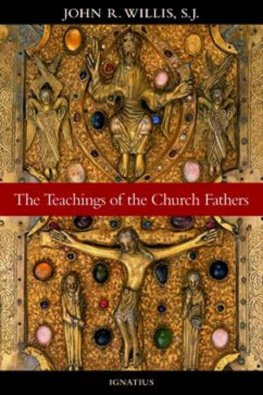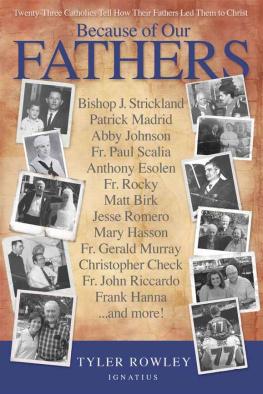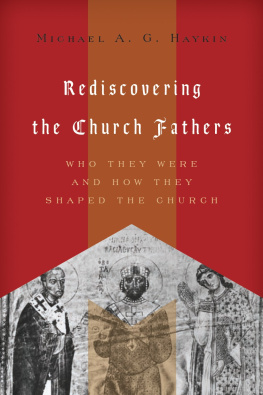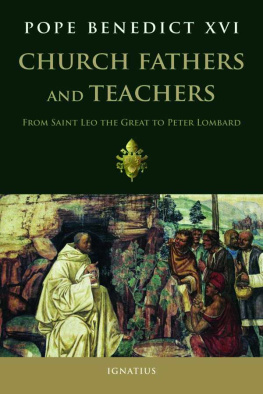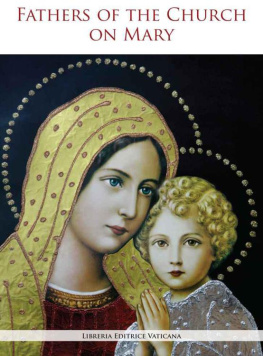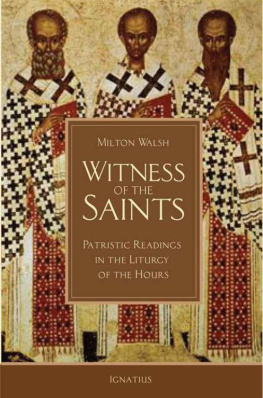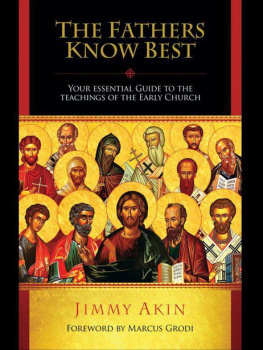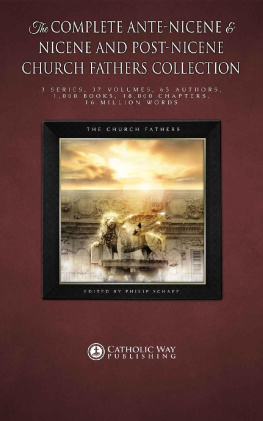John Randolph Willis - The Teachings of the Church Fathers
Here you can read online John Randolph Willis - The Teachings of the Church Fathers full text of the book (entire story) in english for free. Download pdf and epub, get meaning, cover and reviews about this ebook. year: 2002, genre: Religion. Description of the work, (preface) as well as reviews are available. Best literature library LitArk.com created for fans of good reading and offers a wide selection of genres:
Romance novel
Science fiction
Adventure
Detective
Science
History
Home and family
Prose
Art
Politics
Computer
Non-fiction
Religion
Business
Children
Humor
Choose a favorite category and find really read worthwhile books. Enjoy immersion in the world of imagination, feel the emotions of the characters or learn something new for yourself, make an fascinating discovery.
- Book:The Teachings of the Church Fathers
- Author:
- Genre:
- Year:2002
- Rating:4 / 5
- Favourites:Add to favourites
- Your mark:
- 80
- 1
- 2
- 3
- 4
- 5
The Teachings of the Church Fathers: summary, description and annotation
We offer to read an annotation, description, summary or preface (depends on what the author of the book "The Teachings of the Church Fathers" wrote himself). If you haven't found the necessary information about the book — write in the comments, we will try to find it.
The Teachings of the Church Fathers — read online for free the complete book (whole text) full work
Below is the text of the book, divided by pages. System saving the place of the last page read, allows you to conveniently read the book "The Teachings of the Church Fathers" online for free, without having to search again every time where you left off. Put a bookmark, and you can go to the page where you finished reading at any time.
Font size:
Interval:
Bookmark:
THE TEACHINGS OF THE CHURCH FATHERS
OF THE
CHURCH FATHERS
EDITED BY JOHN R. WILLIS, S.J.
IGNATIUS PRESS SAN FRANCISCO
Original edition of The Teachings of the Church Fathers
1966, Herder and Herder, New York
With ecclesiastical approval
All rights reserved
New edition printed by permission of
The Society of Jesus, New England Province
Cover art: Christ in Majesty and Crucifixion
Manuscript cover, gilt silver and jeweled plaque
English, 11th cent., M.708, front cover
Copyright The Pierpont Morgan Library / Art Resource, New York
The Pierpont Morgan Library, New York
Cover design by Roxanne Mei Lum
2002 Ignatius Press, San Francisco
All rights reserved
ISBN 0-89870-893-1
Library of Congress Control Number 2002105238
Printed in the United States of America
Reginae Societatis Jesu
Contents
REVEALED RELIGION
THE CHURCH
SACRED SCRIPTURE AND TRADITION
ONE GOD
THE TRIUNE GOD
CREATION
SIN
ACTUAL GRACE
HABITUAL GRACE
THE INCARNATE WORD
MARY, MOTHER OF GOD AND VIRGIN
THE SACRAMENTS
THE LAST THINGS
Foreword
By Karl Keating
I was in Detroit to debate a well-known and intemperate Fundamentalist writer. Many of his books and most of his public talks were directed against the Catholic Church. I had debated him previously on radio and learned that he freely misrepresented Catholic teachings and history and did not shrink from the low blow. How can you believe a Church that counted Mussolini and Hitler as members in good standing? he asked crowds. That sort of thing.
The school auditorium was packed, and most of the people in the audience were sympathetic to my opponent. Some were more than sympathetic and did not hesitate to jeer when I was at the microphone. Receiving catcalls was a little discomfiting, and I had no illusions about being able to effect any conversions. It would be enough to have a few listeners leave thinking that maybe the Catholic Church was worth a second look. As it turned out, that is what happened, at least in one case.
A few years later I was a speaker in a much more pleasant setting, a conference at an orthodox Catholic college. During a break I ran into apologist Steve Ray, who introduced me to Alex Jones. Youre responsible for Alexs conversion, said Ray. I must have looked puzzled, so Jones told the story.
He had been at that debate in Detroit. Although he did not participate in the jeering, his sympathies were with my opponent. At the time Jones was a minister at a small inner-city church, and he thought that the Catholic Church not only was wrong in its teachings but also was injurious to authentic Christianity. He told me that none of the arguments I made during the debate convinced him that the Catholic position, on any particular issue, was right (a humbling comment!). Then, at the very end of the debate, I said something that made him think, and that turned out to be the remote impetus to his conversion.
During his remarks, my opponent insisted that the first Christians did not believe as Catholics believe today. Instead, the first Christians were proto-Fundamentalists. They believed in sola scriptura and the assurance of salvation, and they disbelieved in the sacraments and the papacy. If a belief can be identified as distinctively Catholic, he said, then we know that early Christians did not hold it. Catholic beliefs were foisted on nascent Christianity through corrupt Churchmen and pagan emperors.
Since most of his anti-Catholic charges were based on the premise that early Christians believed what modern Fundamentalists believe, I thought it instructive, at the end of my remarks, to ask the audience how one might best determine what those early Christians really believed: Would we more likely find the answer in the writings of the early Christians themselves or in the writings of the Protestant Reformers, who came along fifteen hundred years later? Is it more likely that someone reporting shortly after or long after an event would get the facts right, all else being equal?
It was this line of thought that gave Alex Jones pause. He thought it was the one sensible thing said by the Catholic debater. What was recorded in the New Testament would have been understood best by those who lived as its books were produced, since some of them were eyewitnesses to the events and others of them knew eyewitnesses. Then came the next generation, those who lived too late to have seen the events for themselves but to whom the original teaching was passed on intact from the first believers (the ancients being conservative folk and jealous that nothing would be lost in transmission, whether oral or written), and so on for the first few generations and then for the first few centuries.
No doubt, thought Jones, error crept in early enoughafter all, that is how the Catholic Church started, as a promoter and repository of errorbut it did seem that one should be able to find the real Christian faith in the writings of the post-New-Testament Christians. So Jones began to read the writings of the Fathers of the Church. While rejecting all the arguments I had made, he accepted my final suggestionto use Augustines line, he followed the admonition Tolle lege (Take and read). Jones took up Clement of Rome, Justin Martyr, Irenaeus, and the rest and found that the religion they adhered to was distinct from his ownand, distressingly, was identical with Catholicism. The result, a few years later, was that Jones, accompanied by many of his congregants, entered the Catholic Church.
Such is the power of the Fathers of the Church. Their writings more than compensate for the limitations of todays apologists. I have used their words extensively in my own works. Several of my books are aimed, at least in part, at Fundamentalists and Evangelicals. I want them to embrace Catholic teachings, but I know that they demand proof of which teachings comprise authentic Christianity. It would do no good to prove the Catholic case from papal encyclicals and the decrees of ecumenical councilspeople who reject the papacy and who do not believe in the existence of the episcopal office will not be persuaded by appeals to such authorities. For them the argument must be restricted to logical inferences from Scripture and early Christian history, the latter being found in the writings of the Fathers, who lived that historywho were that history.
Although the Fathers are powerful testimony to the truth of the Catholic faith, few Catholics know this because few know them. For many Catholics, ancient Catholicism refers to the time immediately preceding Vatican II. I know of one permanent deacon who boasts that he never reads religious books published before 1965. (I have not had the heart to ask him whether he reads the Bible.) This self-imposed ignorance is no better than that of the professional anti-Catholic who told me that he reads nothing except the Bible.
But how to get to know the Fathers? Their collected writings occupy a long bookshelf, and most of what they have to say, while valuable in itself, is not germane to issues on the minds of todays Catholics and non-Catholics. To learn their teachings on a discrete topic, one must wade through much that is interesting if irrelevant. To know what the early Church thought about infant baptismwas it practiced and, if so, what was it understood to accomplish?one used to have to flip through thousands of pages of the Fathers, hoping to stumble on the material one is seeking. Few had the time or inclination for such work. Fortunately for us, Fr. John R. Willis found the time and had the desire. The Teachings of the Church Fathers is arranged thematically, much like the Catechism of the Catholic Church , to which his book is a useful supplement. He has gathered key paragraphs from the Fathers, collecting them under 250 topics and providing extensive cross-references.
Next pageFont size:
Interval:
Bookmark:
Similar books «The Teachings of the Church Fathers»
Look at similar books to The Teachings of the Church Fathers. We have selected literature similar in name and meaning in the hope of providing readers with more options to find new, interesting, not yet read works.
Discussion, reviews of the book The Teachings of the Church Fathers and just readers' own opinions. Leave your comments, write what you think about the work, its meaning or the main characters. Specify what exactly you liked and what you didn't like, and why you think so.

